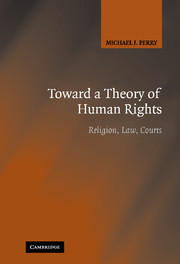Book contents
- Frontmatter
- Contents
- Acknowledgments
- Introduction
- TOWARD A THEORY OF HUMAN RIGHTS
- PART ONE THE MORALITY OF HUMAN RIGHTS
- PART TWO FROM MORALITY TO LAW
- PART THREE FROM LAW TO COURTS
- 8 Protecting Human Rights in a Democracy: What Role for the Courts?
- 9 How Should the Supreme Court Rule? Capital Punishment, Abortion, and Same-Sex Unions
- Summation
- Notes
- Index
9 - How Should the Supreme Court Rule? Capital Punishment, Abortion, and Same-Sex Unions
Published online by Cambridge University Press: 22 July 2009
- Frontmatter
- Contents
- Acknowledgments
- Introduction
- TOWARD A THEORY OF HUMAN RIGHTS
- PART ONE THE MORALITY OF HUMAN RIGHTS
- PART TWO FROM MORALITY TO LAW
- PART THREE FROM LAW TO COURTS
- 8 Protecting Human Rights in a Democracy: What Role for the Courts?
- 9 How Should the Supreme Court Rule? Capital Punishment, Abortion, and Same-Sex Unions
- Summation
- Notes
- Index
Summary
I was concerned in Chapter 8 with the proper role of courts – their proper role, that is, in a liberal democracy – in protecting constitutionally entrenched human rights. I am concerned in this chapter with the proper role of one particular court: the Supreme Court of the United States. The point of departure for this chapter is a position I defended in Chapter 8: Because the power the Supreme Court exercises in protecting constitutionally entrenched human rights is the power of judicial ultimacy, the Court should exercise the power in a deferential (Thayerian) fashion. In this chapter, I pursue the implications of that position for three questions:
Should the Supreme Court rule that capital punishment is “cruel and unusual” within the meaning of the Eighth Amendment to the United States Constitution?
Should it rule that laws banning pre-viability abortions violate the Fourteenth Amendment?
Should it rule that state refusals to recognize, by extending the benefit of law to, same-sex unions violates the Fourteenth Amendment?
In Part Two of this book, I began exploring the human rights dimensions of capital punishment (Chapter 5), abortion (Chapter 6), and same-sex unions (Chapter 7); in this chapter, I continue and conclude the exploration.
CAPITAL PUNISHMENT AND THE EIGHTH AMENDMENT
The Eighth Amendment to the Constitution, which limits both national (federal) and state power, provides:
Excessive bail shall not be required, nor excessive fines imposed, nor cruel and unusual punishments inflicted.
Is capital punishment “cruel and unusual” within the meaning of the Eighth Amendment?
- Type
- Chapter
- Information
- Toward a Theory of Human RightsReligion, Law, Courts, pp. 118 - 140Publisher: Cambridge University PressPrint publication year: 2006



